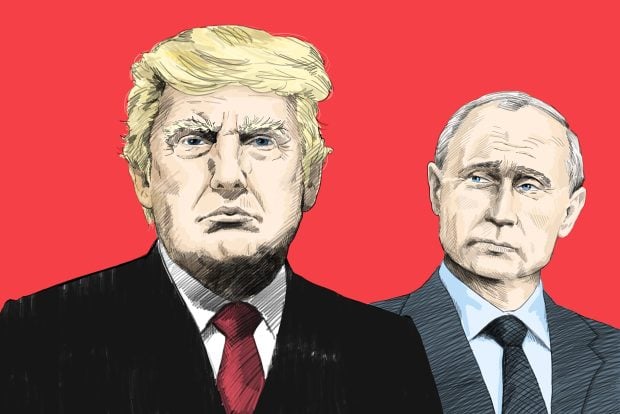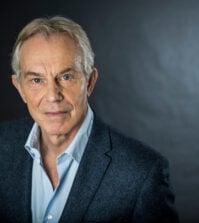Organised chaos: how Russia weaponised the culture wars

Social divisions, conspiracy theories and populist politics are rife in the democratic world. And these are not just home-grown problems: Russia and other hostile states have deliberately stoked internal dissent, weakening their opponents overseas. As we enter a year during which more than two billion people will go to the polls, Global Government Forum is publishing a five-part report on foreign interference in elections – beginning with an explanation of Russia’s goals, and the threat its actions pose to democracy itself
Throughout the democratic world, populations are becoming both increasingly divided, and more suspicious of mainstream politicians, media and institutions. Furious culture wars are being fought online; conspiracy theories and populist leaders are growing in strength; public debates are ever more antagonistic and ill-tempered; elected leaders are subject to a rising tide of abuse and, occasionally, violence. In a year during which 50 countries will hold general elections – including seven of the world’s 10 most populous nations, plus the UK and nine EU states – these changes threaten the stability both of democratic nations, and of the global order.
Commentators often blame our ever-more fractious public debate on the impact of social media – whose algorithms amplify the extreme, the truncated and the combative over more considered and moderate viewpoints – alongside a longer-term decline in respect for authority, exacerbated by 15 years of economic pain for all but the highest-income groups. And these forces have certainly had powerful impacts; but there’s something else going on too. Look more closely, and it becomes clear that the West’s social fractures are caused by assault as well as illness: that, like so many civil wars, the culture wars are fuelled and shaped by actors overseas pursuing their own selfish interests.
What’s more, some of those actors have wider goals than simply aiding their political allies: Russia’s interventions in the 2016 US presidential election campaign are often seen as attempts to put Vladimir Putin’s favourite into the White House, but the Russian leader had his eye on a bigger prize. When “Russia went into planning their operation and throwing their support behind Donald Trump, I don’t think there was anyone in the Kremlin who really thought that he would win,” says David Salvo, a former State Department security policy advisor now working as managing director of transatlantic campaign group the Alliance for Securing Democracy. “Their goal was to inject even more chaos into the American electoral system – which was already toxic.”

“That campaign was not about getting Trump elected,” agrees security expert Elisabeth Braw, a senior associate fellow at the European Leadership Network and a member of the UK’s National Preparedness Commission. “It was about sowing doubts in the minds of Americans that their democracy was in good shape. It’s a common misunderstanding that Russia wants to get certain candidates elected. No: they just wanted to sow doubt among citizens that their countries are working; that the election system is working; that democratic institutions are working.”
Autocratic states – most obviously Russia – have over recent years worked hard to boost distrust and division among the populations of their democratic counterparts: to stoke anger, foster antagonism, deepen scepticism, sow conspiracy theories, and undermine trust in government bodies, traditional information providers and even election processes themselves. It’s difficult to quantify their success with any degree of precision, but we have plenty of evidence of their efforts.
Delving into that evidence, Global Government Forum has examined exactly how these activities benefit hostile nation states, the tools they use and, crucially, how democratic nations can respond. Drawing on primary sources and interviewing international experts, we have produced a five-part report: in this first chapter, we explain Russia’s goals, and what Putin hopes to gain by realising them. Subsequent reports will profile the nature of Russia’s interventions; examine China’s activities; and explain how governments can use intelligence, transparency, regulation and education to tackle the threat.
Domestic drivers
Overseas actors cannot take all the blame for the rising tide of resentment within democratic nations: social media, economic factors and domestic politicians must bear some of the responsibility. Russia is not generating these tensions from scratch, but “amplifying pre-existing discord,” explains Nina Jancowicz, vice president of the Centre for Information Resilience and former director of the US government’s Disinformation Governance Board. “It’s not like they’re creating these narratives,” she adds. “They look at things like racism and gun rights and misogyny, and they say: ‘Okay, what can we pull at the threads of to really encourage some of this behaviour?’”

So, better public sector leadership, policymaking and service delivery can help address the problem. Civil servants can seek to better understand and serve their populations, addressing the resentments that drive division. Elected leaders can commit to promoting evidence-based policymaking and tackling complex, long-standing problems, sacrificing short-term political interests where they have the space to do so. But no attempt to foster a more mature or constructive public debate can be expected to succeed unless it addresses the fresh poisons being injected into the body politic by hostile powers.
We urgently need these efforts to succeed. Talk to almost any top civil servant in the western democracies, and among their biggest concerns are rising public anger, suspicion and tribalism. These dynamics drive support for populist politicians, who offer simple solutions and scapegoats for the country’s problems; but when they get into power, their ill-founded policies fail to address people’s real problems – at which point they look around for new people to blame, often attacking democratic institutions.
These dynamics are clear, for example, in the USA – where Donald Trump has for years deliberately undermined trust in America’s electoral system – and the UK, where Brexiteers seek scapegoats among civil servants, Remainers and even Tory party colleagues for the disappointing consequences of leaving the EU. In the wake of the 6 January 2021 attack on the US Capitol, it is not hyperbolic to argue that not just social cohesion, but democracy itself may be under threat.
Over the coming year, some of those risks will come to a head: the citizens of the UK and USA will be among some two billion around the world with the right to vote in national elections during 2024, along with electors of the European Parliament and nearly 50 other nations. The last time the USA and UK went to the polls at the same time, in 2016, the results were Brexit and a Trump presidency – whose political shockwaves continue to shake both countries. Similar results in 2024 would be likely to have equally huge repercussions.
Read more: Russia’s elections toolkit: dollars, disruption and disinformation
Russia’s goals
Various states have sought to surreptitiously influence public debates and election results in the democratic world, including North Korea and Iran. But the big players are Russia and China, whose contrasting approaches illustrate the range of techniques available – with Russia taking a far more aggressive line.
Russia’s over-riding goal appears – in the words of the UK Parliament’s Intelligence and Security Committee (ISC) – to be the “poisoning of the political narrative in the West by fomenting political extremism and ‘wedge issues’.” UK Labour Member of Parliament Ben Bradshaw – who is taking the UK government to the European Court of Human Rights over its failure to commission an independent investigation into Russian interference – tells GGF that “Russia’s strategic goals have been pretty clear for some time. Along with other hostile state actors in autocratic countries, it is to do whatever they can in their power to weaken, destabilise, question, and cause division in democratic countries”.

Sometimes, Russia does seek to build support for its own narrative, or to assist into positions of power those sympathetic to Putin’s world view. Trump is the obvious example: Russia’s interventions in the 2016 presidential election campaign remain its biggest single overseas influence operation (see below). But just as often, Putin backs any force likely to weaken and divide western nations – including the Scottish independence and Brexit campaigns. “With regards to the Brexit referendum, it was an openly stated objective of Putin’s that he wanted Britain to vote to leave the European Union,” says Bradshaw. “The allyship he showed with pro-Brexit and far-right politicians in this country was in plain sight.”
Russia regularly supports both sides in the West’s ongoing culture wars, simply to deepen social divisions and stoke anger. In 2016, for example, its Internet Research Agency (IRA) published nearly 600 YouTube videos and 30 Facebook pages about police violence against African-Americans: some of these attracted more visitors than the official Black Lives Matter page, according to a report commissioned by the Senate Intelligence Committee. The IRA used its influence, the report found, to stoke anger among African-Americans and to encourage them not to vote. At the same time, the New York Times found, Russian operatives were publishing ‘Blue Lives Matter’ material online – seeking to build support for the pro-police campaign established as a counterweight to Black Lives Matter.
Meanwhile, Russia works to undermine trust in public institutions, established information providers and mainstream media organisations – whittling away the shared truths that support the public discourse, and encouraging people to put their faith only in the partisan voices reinforcing their existing opinions. And it mounts very public attacks on election systems, with the goal of weakening trust in the elections process itself.
“We saw in the 2016 [presidential] election that there were attempts by Russia to manipulate the election,” comments Braw. The US elections system is secure, she says, and Russia did not alter the records of votes cast – but that isn’t the point: “They wanted the public to say: ‘Oh, Russia is interfering. I can’t trust the election system any more’,” she explains. “What matters is that people lose trust in the election system, because if you don’t think that the outcome represents the votes cast, then you won’t have any trust in the politicians elected through that election.”
Pursuing this tactic, Russia has found, can help boost populists in the West – building support for politicians who themselves further divide societies and weaken democracy. Donald Trump has, of course, spent the last four years claiming that the 2020 election was “stolen”: his attacks on the election system’s integrity serve both his own electoral interests, and Russia’s strategic goals.
Read more: A subtle opponent: China’s influence operations
Russia’s gains
So how exactly does weakening the West strengthen Russia? “Russia seems to see foreign policy as a zero-sum game: any actions it can take which damage the West are fundamentally good for Russia,” the cross-party ISC said in 2019. As Jancowicz explains, Russia’s work to influence public opinion is “not just about sowing distrust and confusion; it’s in particular about pitting people in Western democracies against one another. And that serves Russia in a couple of ways”.
First, she explains, growing public anger and disorder make the democracies look bad in the eyes of ordinary Russians – squashing domestic demand for greater accountability or transparency. When protests or riots occur in the West, Russian leaders are “able to point to them and say to their own people: ‘You think the western democracies are so great? Well look what they’ve got going on! They’re beating up journalists, they’re putting protesters in jail. Not so democratic, is it? Aren’t you glad you live in a predictable society like Russia’,” says Jancowicz, adding that in Russia, the January 6 attack on Capitol Hill is depicted as a peaceful protest brutally suppressed by the police.
Second, conflict within democratic nations distracts their leaders – preventing them from focusing on Russia. “That was the case with the US after January 6. It was the case with the UK when Brexit was even more of an issue than it is now,” says Jancowicz. It is also plainly the case now, as the Israel-Hamas conflict fosters public anger against western governments and draws attention and resources away from Ukraine. Putin and Russian state media have openly backed the Hamas narrative, spreading disinformation; the country’s army of bots and social media propagandists have been promoting the same messages.
This is not the first time that Russia has sought to weaponise resentment within Muslim communities against western governments. When in August an Iraqi man living in Sweden burned a copy of the Koran, recalls Braw, Russia’s social media operatives stoked and amplified Muslims’ anger. Western news media reacted by focusing on the Swedish controversy, producing “less about Russia than would have been the case otherwise – especially about Russia’s atrocities in Ukraine,” says Braw. “It’s extremely convenient – and there will always be some issue in the liberal democracies that you can dive into that divides a country and excites minds on social media.”

Third, Russia gains influence – if only because western leaders hope that, by calming the relationship with Russia, they’ll encourage Putin to call off his online dogs. “By creating this mischief, they get invited to have round tables with the leaders,” says Jancowicz. Although Ukraine has dealt Russia’s influence a blow, overall “they’ve been pretty successful in reinflating their status on the global stage”.
So from Putin’s perspective, anything that weakens the democracies strengthens Russia – and internal divisions, as we’ve seen in recent years, are extremely debilitating for democratic countries. In the next report, to be published in a few days’ time, we’ll explore exactly how Russia fosters those divisions.
This is the first of a five-part report into the attempts by government-backed actors – particularly in Russia and China – to influence election outcomes and national debates in the democratic world, with the use of tools including disinformation campaigns, election hacking and party donations.
The second part covers the techniques used by Russia to influence electorates and election results overseas: Russia’s elections toolkit: dollars, disruption and disinformation
The third part covers China’s goals and tools in its electoral interference work: A subtle opponent: China’s influence operations
And the fourth and fifth parts cover ways to tackle election interference: Knowing and showing: how intelligence and transparency can combat electoral interference, and Defeating disinformation: how to create a healthier national conversation



















Excellent report looking forward to the next ones. Wonder if one of them will also address the immigration flow from countries that had Russian influence. And why both Russia and China avoid such influx of migration and keep a national cohesion..
Putin and Russian senior leadership don’t just stoke conspiracy theories, they rely on them as sources of information, to inform their world view and make decisions.
And Putin has made some very bad decisions. Russia is coming apart at the seams. When the dust settles rather than a sweeping psyops victory it might be the seen as the an epic and tragic fail.
I’m optimistic, the fevered swamp water of 2016 has receded. We could be looking at its high water mark right now.